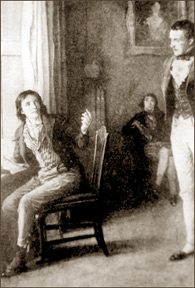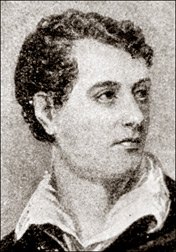|
The world of arts
The boundless source of literature power that shaped the world
Gwen Herat
|

The handsome, arrogant Lord Byron who defied the world to rise
as the best poet in English literature, was placed next to
Shakespeare in ranking. But Byron’s life was short. He died at
thirty six.
|
|

John Keats, yet another precious English poet who may have
outsmarted all poets had he lived beyond his twenty four years.
In this picture, he quotes his famous line: ‘A thing of beauty
is a joy forever’.
|
Besides the Lake poets, four other poets remained famous for their
literature in the first quarter of the nineteenth century. Lord Byron
and Sir Walter Scott were already famous while John Keats and Percy
Bysshe Shelly became equally famous in the following years.
Walter Scott was born in to an older generation than the others.
Scott was sixteen when Byron was born, twenty one when Shelly was born
and twenty four when Keats bounced into this world.
Yet, he outlived all three and was sixty one when he died. Looked at
in every perspect, Scott was far greater than them with a greater
personality who not only made an impression in English literature but
rose to be an icon of a poet. He was passionately fond of romantic
ballads that pushed him to both poetry and writing.
A marvel in writing, his poetry can be divided into three types.
Scott’s imitation of ancient ballads, lyrics scattered through his prose
and his tales in verses. He reached his climax of brightness and
sustained aura in The Lady of The Lake written in 1810 but faded away in
his later poems.
John Keats seated in his study, wrote, ‘A thing of beauty is a
constant joy’ and he read it out to a friend nearby. But his friend was
not satisfied. Keats thought again and wrote his famous line, ‘A thing
of beauty is a joy forever’.
To many of us as it had been before, John Keats was the most
interesting and romantic poet in the English literary world if his
writing continued and had he lived into middle life.
His life was sad and devoid of adventure because he lived only to
write. If we are to analyse the works of Keats when we think of John
Milton and their impact on our literature, and had he died at twenty
five, Milton would not have been as famous. Yet Keats at the same age
had written poems which almost challenged those of Milton in his
maturity.
Lifestyle of Keats
Keats emerged from a poor family background unlike Milton who was
reared and educated among all the influences most fitted to develop in
to a poet of genius. His parents were influential unlike Keat’s. His
father was a carriage-for-hire coachman and born in London mews.
He died when Keats was only eight years. His education was very
ordinary, barely enough to fit him for apprenticeship to a doctor. Keats
gave up this career when he was twenty two because he realised that he
was born to be a poet and should surrender himself to this cause.
He was indeed born to be a poet. Keats published his first volume in
1817 when he was only twenty one. No first book by any young man ever
more clearly foreshadowed his greatness. However, it was reviewed with
great scorn and jealousy and represented menacing criticism, it hurt him
a lot. It had been suggested that the Quarterly Review had killed him.
Sadly, he already had within him the seeds of the disease of which he
died four years later. Keats was a sensible poet and he knew why he was
attacked. Thus, a young life was sacrificed.
To this date, Lord Byron ranks next to Shakespeare in the continent
of Europe in popularity. During his time he was popular in Great Britain
and still retain a mass gathering of admirers.
Of all English poets, Byron was the most personal and in that
perspect he was a complete opposite of Shakespeare. To him the world and
all its contents formed a stage where he could display himself. With
full confidence and arrogance, he somehow reminds Rudolf Nureyev of my
time who thought the world of himself.
George Gorden who was the sixth Lord Byron was to himself the centre
of the universe and all the poems he wrote proclaimed that fact. The
continental mind was able to understand his wrought out glory and the
type of character he was.
He struck a posture before mankind but the average British mind
shrank away from such publicity. To them, Byron was a complete egoist
and most of this countrymen shunned him. But, then he rose to be a
genuine like Nureyev in their own fields.
Byron was the only and spoiled son of well-to-do parents. He was
handsome and complete except for his clubbed feet. He was
self-conscious, conceited and scornful and when he turned eighteen, his
tutor advised him to see more of the world. The cheeky Byron replied his
tutor; ‘You tell me to mix with mankind; I cannot deny such a precept is
wise. I will not descent to a world I despise’.
However, at nineteen he published a book of verses that included
poems, The Hours of Idleness. He was disappointed with the critics who
saw nothing outstanding in it.
The disappointment roused him to fierce anger and he replied in
vigorous, unjust imitation of Pope’s Dunciad, titled The English Bard.
The Scotch Reviewers who acknowledged Walter Scott, Wordsworth,
Coleridge and Southey as remarkable poets, could not do the same to
Byron. But his poem proved that he had the mental vigour and was an
awkward young man with a sizzling future in the literary world.
He went abroad for two years travelling to places where he thought he
could drawn his inspiration. He found it in Portugal, Spain and Greece.
He wrote profusely, with vigour and ease. He became a poet of
credibility overnight. He was only twenty four when this happened. For
seven years he lived on the continent, chiefly in Italy writing his
famous poetry that proved how immensely greater his ability was as
foreseen from early childhood.
In 1823, he set out to redeem his life by doing something worthy. The
thing he planned was closest to his heart was to fight for the freedom
of Greece, that country had risen in rebellion against Turkey. But he
died in Greece on April 19, 1824 at the age of thirty six. |



